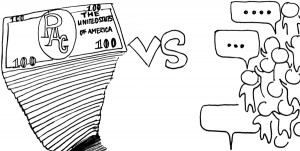Do super PACs kill the youth voice?
Mitt Romney, Ron Paul, Newt Gingrich, Rick Santorum: As if these four Republican presidential contenders weren’t enough to occupy the electorate’s attention, Stephen Colbert just threw himself into the mix.
In last Thursday’s episode of The Colbert Report, Comedy Central’s king of political satire said that he would be forming “an exploratory committee to lay the groundwork” — in other words, a super political action committee — for his possible presidential run.
Colbert’s elaborate joke brings to light an important issue: the legality and fairness of the super PAC.
The super PAC rose in popularity following the 2010 Citizens United v. Federal Election Commission Supreme Court ruling. Whereas individuals cannot directly donate more than $5,000 to presidential campaigns, anyone can now funnel unlimited independent expenditures into a super PAC, as long as the super PAC is not directly linked to a political party or candidate.
Colbert’s super PAC mocks what he and many others see as the transparent potential for corruption inherent in campaign finance laws. A concern less often raised is a super PAC’s potential to suppress the voices of young people — particularly college students — who do not have the resources to compete with massive corporations for influence.
Though this concern is legitimate, money is not the only factor influencing elections. People without the financial capital to contribute make their voices heard through grassroots mobilization and the public exercise of First Amendment rights.
The argument against super PACs disregards the idea that individual political action, grassroots support and the media can have as much power as money. Though a large sum of money from a super PAC might give Newt Gingrich the opportunity to produce an ad slamming Mitt Romney, a critical public’s reaction is what really matters in the long run.
Take the Tea Party as an example. Whether voters agree or disagree with the Tea Party’s platform, these passionate citizens have brought widespread attention to their cause.
A more recent example is the Occupy movement, one which some USC students support and have participated in. Though it is not directly connected to the campaign finance debate, the movement has influenced the liberal side of the election. Protestors’ anti-corporatism cries still resonate today, obviously without the slightest influence of corporate money.
Just as political speech and action should not be suppressed by government, those with the financial resources to contribute to political campaigns should not have their influence stomped out by excessive regulations.
People need to work with what they have to get their voices heard, whether they are corporate executives or starving college students. Barring that right would be an affront to the constitution and an insult to voters’ intelligence.
Sarah Cueva is a sophomore majoring in Middle East studies and political science. Point/Counterpoint runs Fridays.
For a different perspective on this topic, click here.

